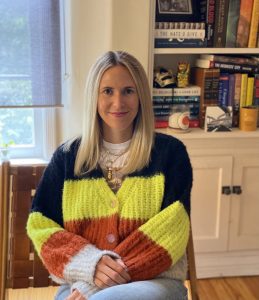 Name: Seija Rankin
Name: Seija Rankin
Title & Organization: Books Editor, Entertainment Weekly
Graduation Year and Degree: 2009 BA in Journalism
Many people have been reading more while staying home during the pandemic, and J-School alum Seija Rankin is here to make sure readers find their next great book. As the Books Editor for Entertainment Weekly, Seija has reviewed everything from thrillers to memoirs to historical fiction. We caught up with her to hear more about her career and how she got to where she is today.
When it comes to your role, what are you most proud of?
Currently I serve as the Books Editor at Entertainment Weekly; while it involves contributing to the brand in all sorts of ways, first and foremost my duty is to oversee and direct all Books coverage and to curate and edit all of the features and stories about books in the magazine. Due to a variety of factors (the pandemic, a parent company with very tight purse strings), those of us who are “editors” also write quite often for the magazine as well—I definitely get a lot of pride and satisfaction from doing those splashier author profiles. But more earnestly, I get a swell of pride whenever our coverage encourages someone to check out a work that I feel is really important, whether it’s a book, film, or TV show. I spend so much time sifting through so many books (I’m often up at night with panic that I’ve missed the next big thing) and to know that people pay attention to what we choose to feature is really gratifying.
What’s the best advice you have for a J-School student who wants to do what you do?
Publishing—and magazine publishing in particular—can be a really hard industry to break into. It can feel really frustrating when you’re young; I moved to New York straight from UW without a single contact in the industry so am a real-life example that it can be done! Even to this day, I’ve gotten all of my writer/editor jobs by applying blind to open, posted positions. In each case I was lucky enough to be picked from the pile of resumes, but got the job from proving myself through the interview and edit test process, not because I was “connected” or knew the right people. But it’s really hard to talk about having and building success in the industry without acknowledging the elephant in the room: The only way to do it, right now, is to work your way up through a series of highly underpaid internships and lower-level gigs and that is a process that isn’t possible for most people. Luckily, there seems to be a broader acknowledgement of the problems that this system causes (for those who want to be journalists, for readers who want to see their own lives and stories reflected back to them in the pages of magazines) and as more and more magazines unionize they’re calling for minimum salary requirements and more transparency in hiring. We’re currently in the process of doing the same at Entertainment Weekly alongside other Meredith Corporation brands. In short, I would say apply, apply, apply, and put more effort into compiling your portfolio and completing edit tests than you think you need to. Finally, I would say to use the alumni channel! I never once approached any J-School alumni when I was looking for a job because I was too intimidated, but I hope students feel comfortable reaching out to me.
What is your favorite J-School memory?
The friends I made along the way! Legitimately. I’m really thankful to the school for teaching me this trade, for giving me the hard skills I use every day (special shoutout to Deborah Blum’s creative nonfiction class), but ultimately I just had such a fun, warm, outgoing group of fellow J-School students to go through those years with, several of which gave me lasting friendships. The people really make the place—a lesson that I took way too long to learn professionally!